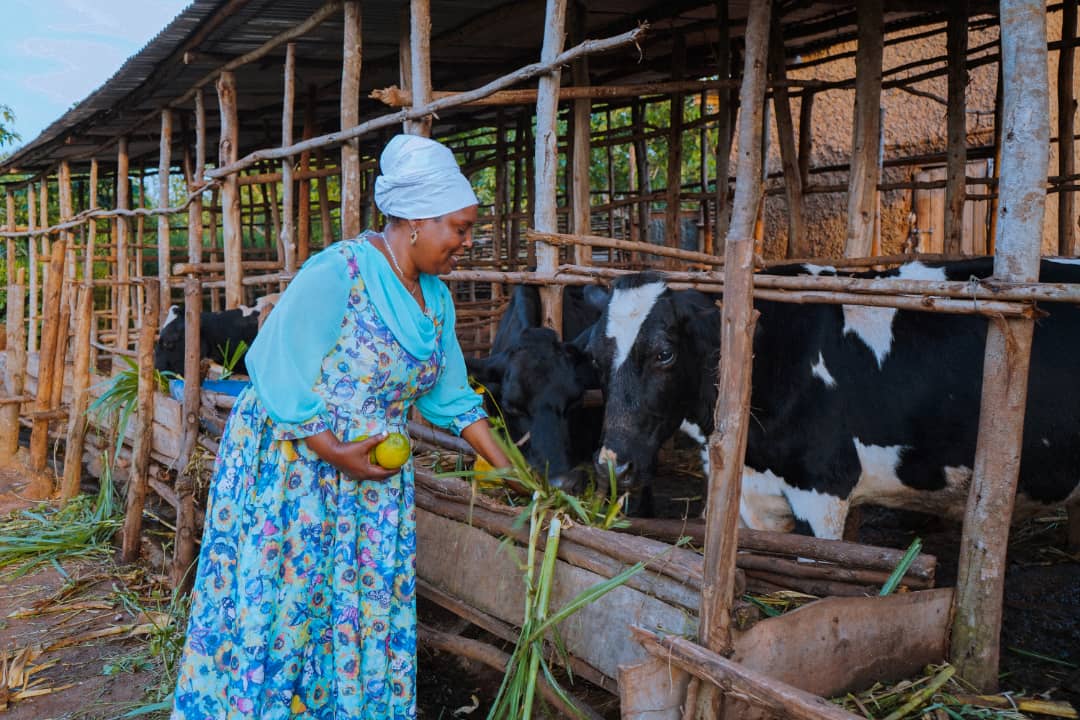For years, Bernadette Umupfuyisoni’s dream of expanding her fruit farm in Gatsibo District remained just that a dream. Water scarcity kept her yields low and her income stagnant. But in 2022, everything changed. With support from the Sustainable Agricultural Intensification and Food Security Project (SAIP), she gained access to solar-powered irrigation, turning her struggling farm into a thriving agribusiness. Today, she not only produces high-value fruits year-round but also provides jobs, supports local nutrition, and inspires small-scale farmers across Rwanda.
![]()
With just five hectares of land and limited irrigation options, her productivity—and income—remained stagnant. But in 2022, a turning point came when she received a grant from the Sustainable Agricultural Intensification and Food Security Project (SAIP). Through this support, she gained access to Small-Scale Irrigation Technology (SSIT), transforming her farm into a thriving agribusiness and securing a better future for her family, as well as creating opportunities for neighboring residents by providing jobs and a stable supply of fresh produce.
![]()
Through SAIP, Umupfuyisoni received essential irrigation resources, including solar panels for sustainable energy, dam sheets for water conservation, and technical installation support to optimize irrigation. These resources enabled her to expand her farmland from 0.5 hectares to 3 hectares. With a reliable irrigation system powered by solar energy, she significantly increased her production, ensuring consistent yields throughout the year.
“Before 2022, I was a small fruit farmer with just 50 mango trees, five orange trees, and 15 avocado trees on 0.25 hectares,” Umupfuyisoni recalled.
![]()
She added, “Now, I have an irrigation system with solar panels that can cover 3 hectares, even though my farm is 5 hectares in total. Water is pumped from the ground to a dam sheet and then used to irrigate the entire farm.”
Thanks to improved irrigation, Umupfuyisoni now cultivates a variety of fruits at a much larger scale: over 350 avocado trees, more than 200 orange trees, and a thriving orchard with over 500 mango trees. All her trees are now fully irrigated, ensuring high-quality produce and steady market supply.

The impact of irrigation on her farm has been remarkable. Her production and revenue have increased significantly. Avocado production, which previously generated RWF 80,000 per season, now reaches RWF 5 million per season. Orange production, which previously earned RWF 500,000 per season, now yields RWF 1 million per season.
![]()
Beyond farming, Umupfuyisoni has diversified into livestock keeping, rearing cows, chickens, rabbits, ducks, geese, and turkeys. Her 10 cows produce 100 liters of milk per day, benefiting the local community.
“Malnutrition cases have reduced in my village because children from vulnerable families receive free milk and eggs,” she stated.
Umupfuyisoni’s success has created employment opportunities in her village. She employs 50 temporary workers and 8 permanent employees. Workers receive 1 liter of milk per day and 3 kilograms of fruit per month, improving their nutrition.
David Hakuzimana, a farm worker, shared his experience: “I have been working here for five years. From my earnings, I was able to build my house and buy a cow.”
![]()
Local business owners have also benefited from Umupfuyisoni’s thriving farm.
Yvonne Nyanzira, a fruit seller in Kiramuruzi sector, said, “Before, I had to travel to other sectors like Kabarore and Kabarondo to buy fruits, spending RWF 15,000 on transport. Now, I get fruits from Umupfuyisoni’s farm and only spend RWF 2,000 on transport.”
Richard Gasana, Mayor of Gatsibo District, praised SAIP for its role in improving food security and reducing malnutrition.
![]()
“SAIP has helped increase the value of agricultural products, improve post-harvest handling, and create jobs in the community. We encourage more women to embrace innovative farming solutions, and we will continue supporting such initiatives,” he stated.
SAIP is funded by the Global Agriculture and Food Security Program (GAFSP) through the World Bank and is implemented under the Rwanda Agriculture and Animal Resources Development Board (RAB). The project aims to enhance agricultural productivity, improve market access, and strengthen food security.
Currently, 988 beneficiaries have received Small-Scale Irrigation Technology (SSIT), covering 2,975 hectares across Rwanda.

Through determination and SAIP’s support, Bernadette Umupfuyisoni has transformed her farming enterprise into a model for sustainable agriculture. Her journey from water scarcity to economic prosperity serves as an inspiration for small-scale farmers across Rwanda, proving that with the right resources and support, farmers can overcome challenges and thrive.
Written by Emma-Marie Umurerwa